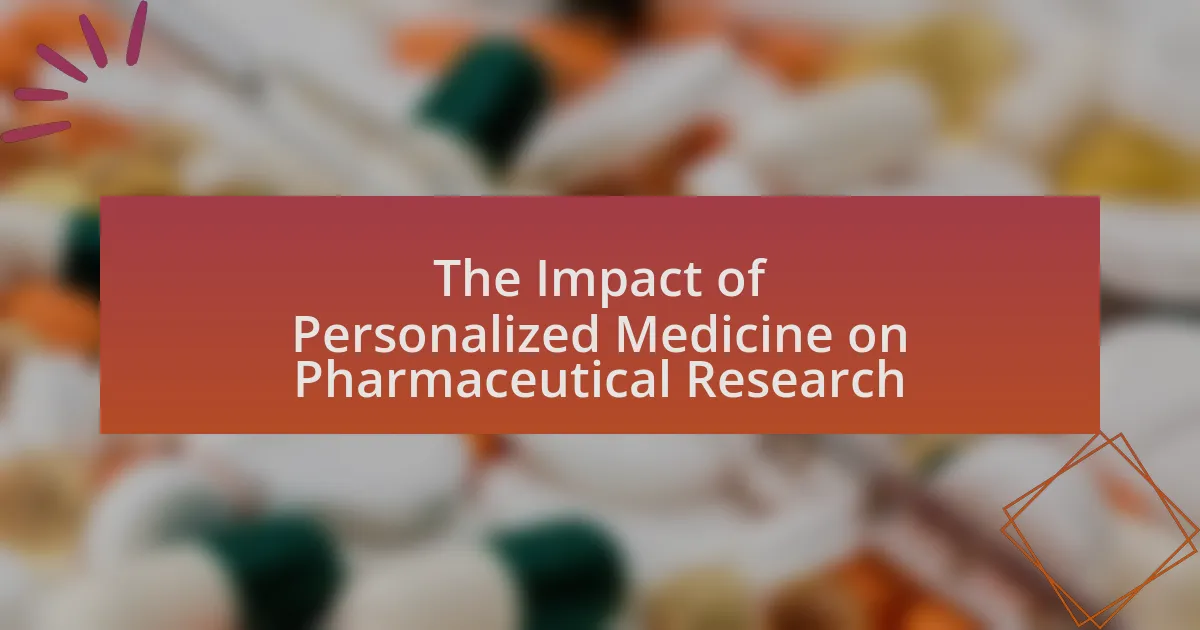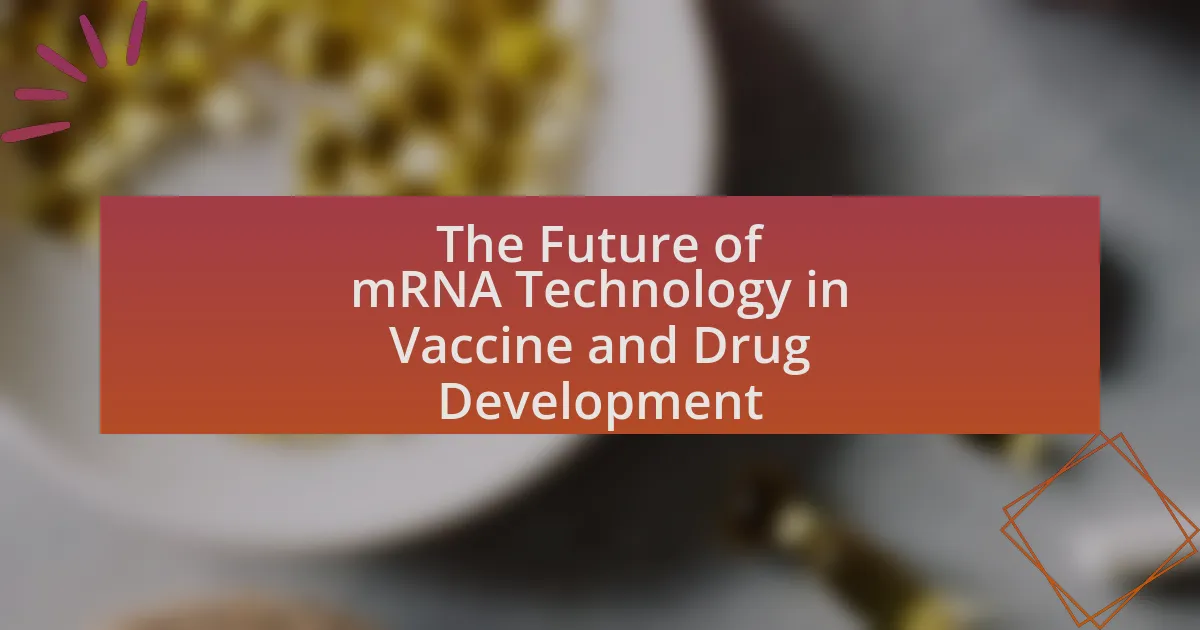Innovations in biologics represent significant advancements in the development and application of biological products, such as monoclonal antibodies, vaccines, and gene therapies, which enhance therapeutic efficacy and improve patient outcomes. This article explores how biologics differ from traditional drug development, highlighting their complexity, production methods, and targeted treatment capabilities. Key characteristics of biologics, driving forces behind their innovation, and the impact of technology and regulatory changes on their development are discussed. Additionally, the article addresses challenges in biologics research, the implications for healthcare, and future trends, including the role of artificial intelligence and potential breakthroughs in gene and cell therapies.
What are Innovations in Biologics?

Innovations in biologics refer to advancements in the development and application of biological products, including monoclonal antibodies, vaccines, and gene therapies. These innovations enhance therapeutic efficacy, improve patient outcomes, and expand treatment options for various diseases. For instance, the development of CAR-T cell therapy represents a significant innovation, allowing for personalized treatment of certain cancers by modifying a patient’s own immune cells to target and destroy cancer cells. Additionally, the use of mRNA technology in vaccines, as seen in COVID-19 vaccines, showcases how biologics can be rapidly developed and deployed in response to emerging health threats.
How do Innovations in Biologics differ from traditional drug development?
Innovations in biologics differ from traditional drug development primarily in their complexity and production methods. Biologics are derived from living organisms and involve intricate processes such as genetic engineering and cell culture, whereas traditional drugs are typically small molecules synthesized through chemical processes. For instance, biologics like monoclonal antibodies require sophisticated biomanufacturing techniques, which can lead to longer development timelines and higher costs compared to the more straightforward synthesis of traditional pharmaceuticals. Additionally, biologics often target specific pathways in diseases, offering precision treatment options, while traditional drugs may have broader mechanisms of action. This distinction highlights the evolving landscape of drug development, where biologics represent a significant shift towards more targeted and personalized therapies.
What are the key characteristics of biologics?
Biologics are complex, large molecules derived from living organisms, characterized by their specificity, efficacy, and ability to target specific pathways in diseases. These products, which include monoclonal antibodies, vaccines, and gene therapies, are designed to interact with biological systems in a precise manner, often leading to fewer side effects compared to traditional small-molecule drugs. The production of biologics typically involves sophisticated biotechnological processes, such as recombinant DNA technology, which ensures high levels of purity and activity. Additionally, biologics often require special storage and handling conditions due to their sensitivity to temperature and light, further distinguishing them from conventional pharmaceuticals.
Why are biologics considered a new frontier in medicine?
Biologics are considered a new frontier in medicine because they represent a significant advancement in targeted therapies that can treat complex diseases more effectively than traditional small-molecule drugs. These biologic therapies, which include monoclonal antibodies, vaccines, and gene therapies, are designed to interact with specific biological pathways, leading to improved efficacy and reduced side effects. For instance, the use of monoclonal antibodies in treating conditions like rheumatoid arthritis and certain cancers has shown remarkable success, with studies indicating that they can lead to higher response rates compared to conventional treatments. This targeted approach not only enhances patient outcomes but also paves the way for personalized medicine, where treatments can be tailored to individual genetic profiles, further solidifying biologics’ role as a transformative force in modern healthcare.
What are the driving forces behind Innovations in Biologics?
The driving forces behind innovations in biologics include advancements in biotechnology, increased understanding of disease mechanisms, and the demand for personalized medicine. Biotechnology advancements, such as CRISPR and monoclonal antibody development, have enabled the creation of more effective biologic therapies. Additionally, a deeper understanding of molecular biology and genetics has facilitated targeted treatments, improving patient outcomes. The growing demand for personalized medicine, which tailors treatments to individual genetic profiles, further propels innovation in biologics, as evidenced by the rise in biologic therapies approved by regulatory agencies, which reached over 300 in recent years.
How has technology influenced the development of biologics?
Technology has significantly influenced the development of biologics by enabling advanced methods for drug discovery, production, and delivery. Innovations such as recombinant DNA technology have allowed for the precise engineering of proteins and antibodies, leading to more effective therapeutic options. Additionally, high-throughput screening techniques have accelerated the identification of potential biologic candidates, while bioprocessing advancements have improved the efficiency and scalability of biologic manufacturing. For instance, the use of cell culture systems and bioreactors has enhanced yield and consistency in producing monoclonal antibodies, which are crucial in treating various diseases. These technological advancements have collectively transformed biologics into a vital component of modern medicine, evidenced by the rapid development of biologic therapies for conditions like cancer and autoimmune disorders.
What role do regulatory changes play in biologics innovation?
Regulatory changes significantly influence biologics innovation by shaping the development pathways and approval processes for new therapies. These changes can streamline regulatory requirements, allowing for faster entry of biologics into the market, as seen with the FDA’s 21st Century Cures Act, which aimed to accelerate the approval of breakthrough therapies. Additionally, updated regulations can encourage investment in biologics by providing clearer guidelines and reducing uncertainty, thereby fostering innovation in the sector. For instance, the introduction of the Biosimilars User Fee Act has facilitated the development of biosimilars, promoting competition and lowering costs for patients.
What challenges are faced in the field of Innovations in Biologics?
The field of Innovations in Biologics faces several significant challenges, including high development costs, complex regulatory pathways, and issues related to manufacturing scalability. High development costs can exceed billions of dollars, making it difficult for smaller companies to enter the market. Complex regulatory pathways, governed by agencies like the FDA, require extensive clinical trials and data, which can prolong the time to market. Additionally, manufacturing scalability poses challenges, as biologics often require specialized processes and facilities that can be difficult to scale up efficiently. These factors collectively hinder the pace of innovation and accessibility of biologic therapies.
What are the common hurdles in biologics research and development?
Common hurdles in biologics research and development include high costs, complex manufacturing processes, regulatory challenges, and lengthy timelines. The high costs are attributed to the extensive research and clinical trials required, often exceeding billions of dollars. Complex manufacturing processes involve intricate bioprocessing techniques that can lead to variability in product quality. Regulatory challenges arise from stringent guidelines set by agencies like the FDA, which require comprehensive data on safety and efficacy. Additionally, the lengthy timelines for development can span over a decade, delaying market entry and increasing financial risk.
How do manufacturing complexities impact biologics innovation?
Manufacturing complexities significantly hinder biologics innovation by increasing production costs and extending development timelines. These complexities arise from the intricate nature of biologics, which often require specialized equipment, stringent regulatory compliance, and precise control of production conditions. For instance, the manufacturing process for monoclonal antibodies involves multiple steps, including cell culture, purification, and formulation, each of which presents unique challenges that can lead to delays and increased expenses. According to a report by the Biotechnology Innovation Organization, the average cost to develop a biologic can exceed $1 billion, largely due to these manufacturing hurdles. Consequently, the difficulties in scaling up production and ensuring consistent quality can stifle the introduction of new biologic therapies into the market, ultimately impacting patient access to innovative treatments.
How are Innovations in Biologics transforming drug development?

Innovations in biologics are transforming drug development by enabling the creation of targeted therapies that address specific disease mechanisms. These advancements include the development of monoclonal antibodies, gene therapies, and personalized medicine approaches, which enhance efficacy and reduce side effects compared to traditional small molecule drugs. For instance, monoclonal antibodies have revolutionized cancer treatment by specifically targeting tumor cells, leading to improved patient outcomes. Additionally, the use of biologics in treating autoimmune diseases has shown significant success, with therapies like adalimumab demonstrating a 70% response rate in patients with rheumatoid arthritis. These innovations not only streamline the drug development process but also facilitate faster regulatory approvals, as evidenced by the increasing number of biologics receiving expedited review from the FDA.
What are the most significant advancements in biologics?
The most significant advancements in biologics include the development of monoclonal antibodies, gene therapies, and biosimilars. Monoclonal antibodies have revolutionized the treatment of various diseases, including cancer and autoimmune disorders, by targeting specific antigens with high precision. Gene therapies, such as those used in treating genetic disorders like spinal muscular atrophy, have shown the potential to correct underlying genetic defects, offering long-term solutions rather than symptomatic treatments. Biosimilars, which are highly similar versions of already approved biologic products, have increased accessibility and reduced costs for patients, enhancing the overall landscape of biologic therapies. These advancements are supported by clinical trials and regulatory approvals that demonstrate their efficacy and safety, marking a transformative era in drug development.
How have monoclonal antibodies changed treatment paradigms?
Monoclonal antibodies have significantly transformed treatment paradigms by providing targeted therapies that improve efficacy and reduce side effects compared to traditional treatments. These biologics are designed to bind specifically to antigens on cancer cells or pathogens, enhancing the immune response and allowing for more precise treatment strategies. For instance, the introduction of trastuzumab for HER2-positive breast cancer has led to improved survival rates, demonstrating the effectiveness of monoclonal antibodies in oncology. Additionally, their application in autoimmune diseases, such as rheumatoid arthritis with agents like adalimumab, showcases their role in modulating immune responses. The shift towards personalized medicine, facilitated by monoclonal antibodies, marks a pivotal change in how diseases are treated, emphasizing the importance of targeted therapies in modern healthcare.
What innovations are emerging in gene and cell therapies?
Innovations in gene and cell therapies include advancements in CRISPR technology, which allows for precise gene editing, and the development of CAR-T cell therapies that enhance the immune system’s ability to target cancer cells. These innovations are supported by clinical trials demonstrating significant efficacy; for instance, CAR-T therapies have shown remarkable success in treating certain types of leukemia and lymphoma, with response rates exceeding 80% in some studies. Additionally, the emergence of gene delivery systems, such as lipid nanoparticles, has improved the efficiency of delivering therapeutic genes to target cells, further enhancing treatment outcomes.
How do Innovations in Biologics improve patient outcomes?
Innovations in biologics improve patient outcomes by providing targeted therapies that enhance treatment efficacy and reduce side effects. These advancements, such as monoclonal antibodies and gene therapies, allow for personalized medicine approaches, which have been shown to significantly increase response rates in conditions like cancer and autoimmune diseases. For instance, the introduction of monoclonal antibodies has led to a 30-50% improvement in survival rates for certain cancers compared to traditional therapies. Additionally, biologics often result in fewer adverse effects, as they specifically target disease mechanisms rather than affecting the entire body, thereby improving overall patient quality of life.
What evidence supports the efficacy of biologics in treating diseases?
Biologics have demonstrated efficacy in treating diseases through numerous clinical trials and real-world evidence. For instance, monoclonal antibodies like adalimumab have shown significant improvements in patients with rheumatoid arthritis, with studies indicating a 70% improvement in symptoms compared to placebo groups. Additionally, biologics such as trastuzumab have been pivotal in treating HER2-positive breast cancer, leading to a 33% reduction in the risk of disease recurrence as evidenced by the Herceptin Adjuvant (HERA) trial. Furthermore, the use of biologics in conditions like psoriasis has been validated by the CLEAR study, which reported over 75% of patients achieving clear or almost clear skin after treatment. These examples underscore the robust evidence supporting the efficacy of biologics across various diseases.
How do biologics personalize medicine for patients?
Biologics personalize medicine for patients by targeting specific biological pathways and mechanisms involved in diseases, allowing for tailored treatment approaches. These therapies, derived from living organisms, can be designed to interact with unique molecular targets, such as proteins or genes, that are specific to an individual’s condition. For instance, monoclonal antibodies can be engineered to bind to specific antigens on cancer cells, enhancing the immune response against those cells. This precision in targeting not only improves efficacy but also minimizes side effects compared to traditional therapies. The development of biologics has been supported by advancements in genomics and proteomics, which enable the identification of biomarkers that predict patient response to specific treatments, further enhancing the personalization of medicine.
What future trends can we expect in Innovations in Biologics?
Future trends in innovations in biologics include the advancement of personalized medicine, the integration of artificial intelligence in drug discovery, and the development of next-generation biologics such as bispecific antibodies and CAR-T therapies. Personalized medicine is gaining traction as it allows for tailored treatments based on individual genetic profiles, improving efficacy and reducing adverse effects. The use of artificial intelligence is streamlining the drug discovery process, enabling faster identification of potential biologics candidates and optimizing clinical trial designs. Additionally, the emergence of bispecific antibodies and CAR-T therapies represents a significant leap in targeting multiple pathways in diseases, particularly in oncology, enhancing therapeutic outcomes. These trends are supported by increasing investments in biotech research and a growing understanding of complex diseases, which are driving the evolution of biologics in drug development.
How might artificial intelligence shape the future of biologics?
Artificial intelligence will significantly shape the future of biologics by enhancing drug discovery, optimizing clinical trials, and personalizing treatment options. AI algorithms can analyze vast datasets to identify potential drug candidates more efficiently than traditional methods, reducing the time and cost associated with bringing biologics to market. For instance, a study published in Nature Biotechnology demonstrated that AI-driven approaches could predict protein structures with remarkable accuracy, which is crucial for biologics development. Additionally, AI can streamline clinical trial processes by identifying suitable patient populations and predicting outcomes, thereby increasing the likelihood of successful trials. This integration of AI into biologics not only accelerates innovation but also improves patient outcomes through tailored therapies.
What potential breakthroughs are on the horizon for biologics?
Potential breakthroughs on the horizon for biologics include advancements in gene editing technologies, such as CRISPR, which enable precise modifications to genetic material for therapeutic purposes. These technologies are expected to enhance the efficacy of biologics by allowing for targeted treatments of genetic disorders and cancers. Additionally, the development of bispecific antibodies is gaining traction, as they can simultaneously bind to two different targets, improving treatment outcomes for complex diseases like cancer. Furthermore, the integration of artificial intelligence in drug discovery processes is anticipated to accelerate the identification of new biologic candidates, streamlining development timelines and reducing costs. These innovations collectively represent significant progress in the field of biologics, promising more effective and personalized treatment options.
What are the implications of Innovations in Biologics for healthcare?

Innovations in biologics significantly enhance healthcare by improving treatment efficacy and patient outcomes. These advancements lead to the development of targeted therapies that can address specific diseases, such as monoclonal antibodies for cancer treatment, which have shown to increase survival rates by up to 30% in certain patient populations. Additionally, biologics often result in fewer side effects compared to traditional pharmaceuticals, as they are designed to interact with specific biological targets. The introduction of biosimilars also promotes cost-effectiveness in healthcare, potentially reducing drug prices by 20-30%, thereby increasing patient access to essential medications. Overall, innovations in biologics are transforming healthcare by providing more effective, safer, and affordable treatment options.
How do Innovations in Biologics affect healthcare costs?
Innovations in biologics generally lead to increased healthcare costs due to their complex manufacturing processes and high research and development expenses. For instance, biologic drugs often require extensive clinical trials and specialized production facilities, which can drive up the initial costs significantly. According to a report from the IQVIA Institute for Human Data Science, the average annual cost of biologic therapies can exceed $100,000 per patient, contributing to overall healthcare expenditure. Additionally, while biologics can provide effective treatments for chronic conditions, their high price tags can strain healthcare budgets and insurance systems, leading to increased premiums and out-of-pocket costs for patients.
What are the economic impacts of biologics on the healthcare system?
Biologics significantly impact the healthcare system economically by increasing treatment costs while also providing cost savings through improved patient outcomes. The introduction of biologics has led to higher drug prices, with some therapies exceeding $100,000 annually, which contributes to overall healthcare expenditure. However, these therapies often result in reduced hospitalizations and fewer complications, translating to long-term savings for healthcare systems. For instance, a study published in the Journal of Managed Care & Specialty Pharmacy found that biologics for rheumatoid arthritis reduced total healthcare costs by approximately 30% due to decreased need for surgical interventions and hospital stays. Thus, while biologics elevate upfront costs, their potential to enhance health outcomes can lead to overall economic benefits for the healthcare system.
How do biologics influence insurance coverage and reimbursement?
Biologics significantly influence insurance coverage and reimbursement by often commanding higher costs, which leads insurers to implement stringent criteria for approval. The high price of biologics, sometimes exceeding $100,000 annually for certain therapies, prompts insurers to require extensive documentation of medical necessity and prior authorization processes. Additionally, the introduction of biosimilars, which are lower-cost alternatives to biologics, has begun to affect reimbursement strategies, as insurers may incentivize their use to manage costs while maintaining patient access to effective treatments. This dynamic creates a complex landscape where the value assessment of biologics plays a crucial role in determining coverage policies and reimbursement rates.
What ethical considerations arise from Innovations in Biologics?
Innovations in biologics raise several ethical considerations, primarily concerning patient safety, informed consent, and equitable access. Patient safety is paramount, as biologics can have complex effects on human biology, necessitating rigorous testing to avoid adverse reactions. Informed consent is critical, as patients must fully understand the risks and benefits associated with novel biologic therapies, which can be challenging due to their complexity. Equitable access is another significant concern, as disparities in healthcare systems may prevent certain populations from benefiting from these advancements, potentially exacerbating existing health inequalities. These ethical considerations highlight the need for robust regulatory frameworks and ethical guidelines to ensure that innovations in biologics are developed and implemented responsibly.
How do we address access and equity in biologics development?
Access and equity in biologics development are addressed through strategies that ensure diverse populations are included in clinical trials and that pricing models are equitable. Inclusive clinical trial designs, such as community engagement and outreach, help to recruit underrepresented groups, ensuring that the safety and efficacy of biologics are evaluated across different demographics. Additionally, tiered pricing and patient assistance programs can make biologics more affordable, particularly in low-income regions. For instance, the World Health Organization emphasizes the importance of equitable access to medicines, highlighting that innovative pricing strategies can improve access for marginalized populations.
What are the ethical implications of gene editing technologies?
The ethical implications of gene editing technologies include concerns about consent, equity, and potential unintended consequences. These technologies, such as CRISPR, raise questions about the rights of individuals to make decisions about their genetic makeup and the implications for future generations. Additionally, there is a risk of exacerbating social inequalities if access to gene editing is limited to certain populations. Unintended consequences, such as off-target effects or ecological impacts, further complicate the ethical landscape, necessitating careful consideration and regulation.
What best practices should be followed in the development of biologics?
Best practices in the development of biologics include rigorous preclinical testing, adherence to regulatory guidelines, and implementation of quality control measures. Rigorous preclinical testing ensures that biologics are evaluated for safety and efficacy before human trials, which is critical given the complexity of biological products. Adherence to regulatory guidelines, such as those set by the FDA and EMA, is essential to ensure compliance and facilitate the approval process. Quality control measures, including consistent manufacturing processes and thorough characterization of the biologic, are necessary to maintain product integrity and patient safety. These practices are supported by historical data showing that biologics developed with stringent protocols have higher success rates in clinical trials and post-market performance.
How can researchers ensure compliance with regulatory standards?
Researchers can ensure compliance with regulatory standards by implementing a robust quality management system that aligns with guidelines set by regulatory agencies such as the FDA and EMA. This involves conducting thorough preclinical and clinical trials, maintaining accurate documentation, and adhering to Good Laboratory Practices (GLP) and Good Clinical Practices (GCP). For instance, the FDA mandates that all biologics must undergo rigorous testing for safety and efficacy before approval, which necessitates that researchers follow established protocols and submit comprehensive data for review. Additionally, ongoing training and education on regulatory updates help researchers stay informed about changes in compliance requirements, thereby reinforcing adherence to standards throughout the drug development process.
What strategies can enhance collaboration in biologics research?
Enhancing collaboration in biologics research can be achieved through the establishment of interdisciplinary teams, which integrate diverse expertise from biology, chemistry, and engineering. This approach fosters innovation by combining different perspectives and skills, leading to more comprehensive solutions. For instance, collaborative platforms such as the Biologics Development Consortium have demonstrated that shared resources and knowledge among academic institutions and industry partners can accelerate the development of biologic therapies. Additionally, implementing regular communication channels and joint research initiatives can further strengthen partnerships, as evidenced by successful collaborations in projects like the Accelerating Medicines Partnership, which has effectively pooled resources to tackle complex biological challenges.





